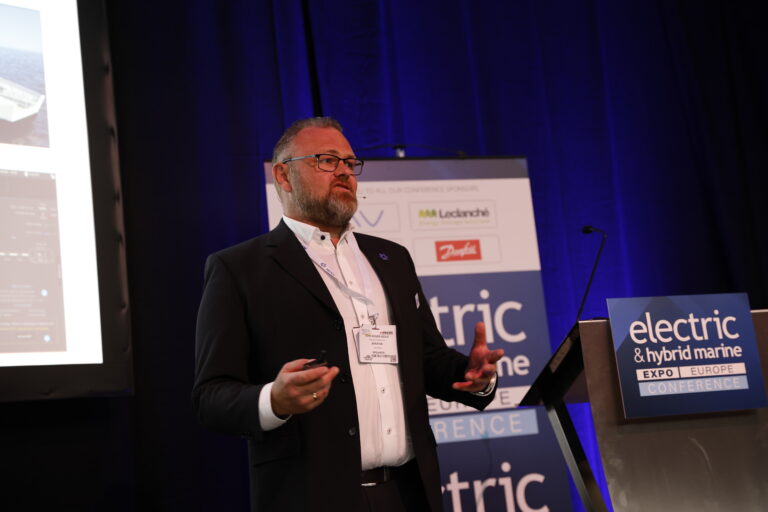With just two weeks to go until Electric & Hybrid Marine Expo Europe, the maritime industry’s premier event dedicated to electrification, hybridization and improved sustainability, Electric & Hybrid Marine Technology International editor-in-chief Matt Ross selects a few of his speaker highlights from the upcoming Electric & Hybrid Marine Expo Conference. The conference takes place alongside the exhibition, which will be staged at RAI Amsterdam, the Netherlands, on June 18, 19 & 20, 2024. Click here to view the full program and book your conference pass here.
The challenges to ship owners in the decarbonization process, and the responsibilities of equipment manufacturers
(Elias Boletis, chair, CIMAC Working Group 10)
MR: For this keynote presentation, Elias Boletis is uniquely placed to provide insight into a lot of the questions facing the marine sector. He is responsible for the CIMAC Working Group 10 ‘End Users’ – primarily ship owners – and provides a link between the ship owners and the equipment manufacturers for the marine sector. During his presentation, he’ll unpick the questions about the drivers of technological progress toward decarbonization in the marine sector. Are they pulled along by demand from ship owners or pushed forward by equipment manufacturers? What are the implications of either approach? Which would be best and should either do more of the same, less or something entirely different?
How does hybridization support the adoption of new fuels?
(Uwe Heine, chief technologist, Wärtsilä Marine)
MR: This will be a chance to learn about the role of new fuels, such as ammonia and methanol, from a leading voice in the industry. Uwe Heine is chief technologist in ship electrification solutions at Wärtsilä and lectures in marine electronics at the Technical Universities of Hamburg and Berlin. New fuels are on the rise, but they will cost more and require specialized storage and delivery systems while having a lower power density than traditional fuel. This presentation will explain how hybridization supports the transition to future fuels, including improving load management and efficiency to save fuel.
Project ZEPHR – Zero-Emission Ports Hydrogen Refueling
(Chloe Fisher, project manager, Sea-Kit International; John Dillon-Leetch, port hydrographer, Port of London Authority)
MR: This presentation is by the consortium partners of Project ZEPHR, which is funded through the UK government’s ZEVI (Zero Emission Vessel and Infrastructure) competition. The project encompasses the design, manufacture and operation of a green-hydrogen-fueled uncrewed surface vessel (USV), to be operated on the River Thames in London, and includes local green hydrogen production and storage.
Charging battery-powered vessels at sea
(Håvard Vollset Lien, VP research and innovation, Vard Group; Øystein Longva, CTO, Vard Electro)
MR: I’m a keen follower of developments relating to offshore charging, as it’s something I’d like to explore more in the magazine. So this presentation, which describes an innovative battery charging solution for offshore use on board vessels working in offshore wind, will be one to catch. In March 2024, the solution was tested in full scale in the North Sea by the SOV Rem Power, demonstrating that it is fully feasible to charge large battery-powered vessels in an open-water environment. The presentation will present the findings and experiences from the tests, the challenges and how they were solved, as well as the supporting activities of the project. I’ve spoken with Øystein Longva in the past for the E&H Marine Awards, so I’m keen to hear his and his colleague’s thoughts on the subject.
Protecting the environment without compromising performance – hybrid case study
(Tobias Kohl, director application engineering marine, Rolls-Royce Solutions)
MR: In 2021, Liberty Lines embarked on a plan to renew its entire fleet of high-speed ferries while aiming to minimize the environmental impact of its operations. Liberty Lines contracted for 12 new vessels, which will navigate in fully electric mode near ports and will then be able to recharge their batteries in the open sea. During long periods of stopover, the ships will use cold ironing to recharge the batteries and keep all the onboard services active to help lower the CO2 footprint. Tobias Kohl’s presentation will provide a more detailed overview of this exciting project.



